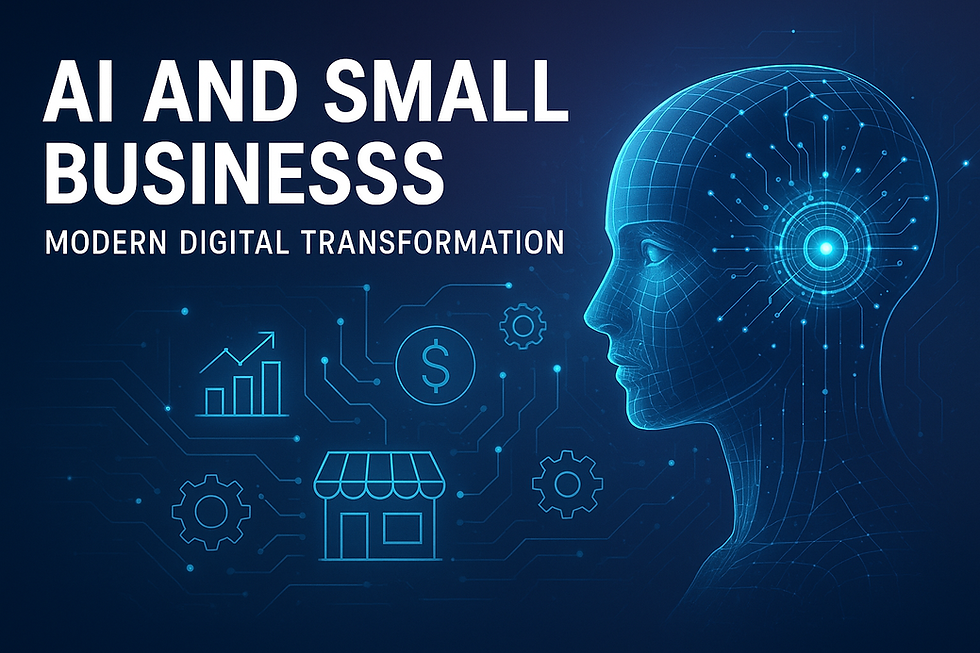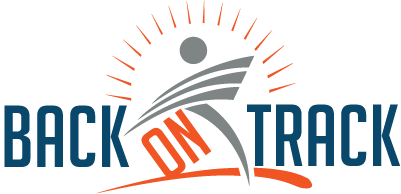AI and Small Business: Your Survival Guide for the Digital Revolution
- Motty Chen

- Jun 15, 2025
- 7 min read

Everywhere I look, on any site or article, and whoever I talk with - they all talk about AI in one way or another. But when it comes to action, only a few are actually taking it seriously enough and start planning. As a technology leader and a business coach, I wanted to share my personal two cents with you and join the trend. I hope you will find it helpful.
Let me get straight to the point. Artificial intelligence isn't some sci-fi fantasy anymore. it's knocking on your door right now, and it's going to fundamentally change how you run your business. Whether you're running a law firm, a restaurant, or a retail shop, AI is about to reshape your world in ways that'll either make you more competitive or leave you scrambling to catch up.
The Economic Reality Check: AI's Massive Impact on Our Economy
Here's the deal: AI is already affecting nearly 40% of jobs worldwide, according to the International Monetary Fund. That's not some distant future prediction—that's happening right now. We're looking at AI potentially adding between $15.7 trillion to $25.6 trillion to the global economy over the next decade. To put that in perspective, that's more than the entire output of China and India combined.
But here's what really matters for small business owners: this isn't just about big corporations anymore. A staggering 77% of small businesses have already adopted AI in some capacity, and 98% are using AI-enabled tools. The train has left the station, folks.
What This Means for Jobs and Your Workforce
Let's be real about the job market impact. While AI is expected to displace about 85 million jobs by 2025, it's also projected to create 97 million new roles. That's a net gain of 12 million jobs, but here's the kicker - these aren't going to be the same jobs we're losing.
The skills needed for work are expected to change by 70% by 2030. That means if you're not thinking about how to upskill your team, you're already behind. But here's the opportunity: companies using AI are reporting an 80% improvement in daily productivity, and they're saving an average of 22% on process costs.
This Isn't Just Another Tech Buzzword—It's the Real Deal
When people hear "digital transformation," their eyes might glaze over, thinking it's just corporate speak. But combine cloud computing with AI, and you're looking at the biggest shift in how businesses operate since the internet itself.
The numbers don't lie: companies that adopt cloud technology experience 2.3% to 6.9% higher revenue growth than those that don't. And when you layer AI on top of that cloud infrastructure, small businesses can suddenly compete with enterprises that have million-dollar IT budgets.
This transformation is happening so fast that business leaders are saying the pace of change at work is accelerating, with almost two-thirds of professionals feeling overwhelmed by how quickly their jobs are changing. Digital transformation investments are predicted to reach $3.9 trillion by 2027, so this isn't slowing down anytime soon.
Your North Star: Anchor in Values, Navigate with Purpose
Here's something that often gets lost in all the AI excitement: while your technology stack will evolve, your marketing tactics will adapt, and your operational methods will transform, your core values and fundamental purpose should remain your constant north star.
This isn't just feel-good business philosophy - it's strategic wisdom. When you're grounded in your values and crystal clear on your purpose, you'll actually be more creative in exploring AI opportunities, not less. Your values act as guardrails that help you evaluate which AI tools align with who you are as a business, and your purpose provides the lens through which you can spot the most meaningful applications of artificial intelligence.
Consider a business whose core purpose is to enhance customer satisfaction in retail. By integrating AI chatbots, this retail business can provide instant support and personalized shopping experiences for customers at any time. The chatbots can assist in answering queries, offering product recommendations, and facilitating orders, all while ensuring that human representatives are available for more complex interactions. This way, AI supports the business purpose by streamlining operations and improving the overall customer experience..
If your values include transparency and trust, you'll naturally gravitate toward AI solutions that enhance accountability rather than obscure decision-making processes.
The businesses that thrive during this AI transformation won't be the ones that adopt every new tool. They'll be the ones that thoughtfully integrate AI in ways that amplify their fundamental mission and strengthen their core values.
Where Small Business Leaders Need to Focus Right Now
The 2-5 Year Reality Check
In the next 2-5 years, you're going to experience the impact of AI on your business, whether you're ready or not. Here's what smart small business leadership teams are focusing on:
Customer Experience Enhancement: 53% of small business owners report that AI positively impacts their customers' experience. This isn't optional anymore, it's table stakes.
Operational Efficiency: AI tools are saving small business owners 13 hours per week on average. That's more than a full day back in your schedule every single week.
Competitive Positioning: 67% of small business owners say AI helped them acquire new customers and grow revenue. Your competitors are already using these tools to eat your lunch.

The Smart Strategy: Embrace and Transform, Don't Replace
Here's the key insight that separates the winners from the losers: the goal isn't to replace your workforce with robots. It's to amplify what your people can do. Companies that get this right see their employees freed up to focus on high-value tasks 76% of the time.
The strategy is threefold:
Identify repetitive, time-consuming tasks that AI can handle
Upskill your team to work alongside AI tools
Reinvest the time savings into strategic, creative, and relationship-building activities
The Strategic Imperative: Leadership Team Discussions
This AI transformation isn't something you can delegate to your IT person or figure out on the fly. It requires intentional leadership discussion and strategic planning. Your leadership team needs to have regular conversations about how AI will impact your industry, your competitive landscape, and your internal operations.
These aren't one-off meetings, either. As AI capabilities evolve rapidly, your leadership team should be dedicating time in every strategic session to discuss emerging AI opportunities and threats. This is where the rubber meets the road - where you move from awareness to action.
Many leadership teams find that bringing in an external perspective can accelerate these crucial conversations. Sometimes, an outside leadership coach can help you see blind spots, facilitate difficult discussions about change management, and ensure your team is aligned on your AI strategy. If you're looking for guidance on how to structure these strategic discussions and align your leadership team around AI transformation, resources like Back on Track can provide the framework and facilitation needed to turn AI anxiety into AI advantage.
Industry-Specific AI Implementation: Your Playbook
There is almost no industry that will not be affected by AI. You just need to be creative and innovative, so you are prepared and ready. Here are some examples to get your creativity wheels rolling:
Law Firms: From Billable Hours to Value Creation
Legal practices are experiencing a fundamental shift. While 72% of lawyers feel comfortable using AI for non-legal administrative tasks, only 21% are ready to apply it to core legal work. But here's the opportunity:
Document Automation: AI can draft routine pleadings and court documents, freeing up attorneys for complex legal analysis. Small firms are already using AI to expedite document drafting three times faster than traditional methods.
Client Service Enhancement: AI-powered legal platforms are helping small businesses access affordable legal help through automated form generation and preliminary legal guidance.
Time Tracking Revolution: AI tools can capture billable time that's otherwise difficult to track, like the hundreds of emails lawyers field daily.
Restaurants: The Kitchen Revolution
The restaurant industry is seeing dramatic AI adoption across both front and back-of-house operations:
Customer Service Automation: AI-powered phone systems and chatbots can handle reservations, take orders, and answer common questions 24/7. This means you never miss a customer call, even during rush periods.
Inventory Optimization: AI systems analyze historical sales data, current trends, and even weather patterns to predict demand accurately. Restaurants using AI for inventory management are reducing food waste by up to 20%.
Kitchen Operations: Computer vision algorithms can inspect food items for quality control and monitor food production in real-time. This ensures consistency while reducing customer complaints.
Smart Scheduling: AI can optimize staff scheduling based on predicted demand patterns, helping you avoid both understaffing and unnecessary labor costs.
Retail: The Personalization Advantage
Retail AI adoption has increased by 25% year over year since 2020, and here's how small retailers can compete:
Personalized Recommendations: AI-powered recommendation engines can suggest products based on customer behavior, just like Amazon does. Local retailers are achieving 95% accuracy in demand prediction using these tools.
Dynamic Pricing: AI can adjust pricing in real-time based on demand, competition, and inventory levels. No more guessing games on pricing strategy.
Customer Service: AI chatbots can handle routine inquiries, process returns, and provide product information, freeing up staff for complex customer needs.
Inventory Management: Predictive analytics help retailers know exactly what to stock and when, reducing both overstock and stockouts.
Service Providers: Scaling Without Scaling
For consultants, agencies, and other service providers, AI offers unique opportunities to scale operations without proportionally scaling headcount:
Content Creation: AI can generate initial drafts for reports, proposals, and marketing materials, with human expertise adding the strategic insights and personal touch.
Data Analysis: AI can process and analyze client data to identify patterns and insights that inform strategic recommendations.
Client Communication: Automated scheduling, follow-up emails, and progress reporting can be handled by AI, allowing service providers to focus on high-value strategic work.
Project Management: AI tools can track project progress, identify potential bottlenecks, and optimize resource allocation across multiple client engagements.
Your Action Plan: Getting Started Today
The reality is simple: AI isn't coming - it's here. Small businesses that embrace this transformation now will have a significant competitive advantage over those that wait. The companies already implementing AI are seeing substantial benefits in productivity, customer satisfaction, and profitability.
Start small, think big, and move fast. Pick one area of your business where you spend the most time on repetitive tasks, find an AI tool that addresses that pain point, and begin experimenting. Your future self and your bottom line will thank you.
But remember: as you navigate this transformation, keep your core values and purpose as your guiding principles. They won't change, even as your vision and methods evolve. This grounding will actually enhance your creativity in finding the right AI applications for your unique business.
The digital revolution powered by cloud computing and AI isn't a buzzword or a distant possibility. It's the new reality of business, and the sooner you embrace it, with your leadership team fully engaged in strategic discussions about implementation - the better positioned you'll be to not just survive, but thrive in this new landscape.
Last words: This isn't about replacing the human element in your business. It's about amplifying it, making your team more effective, and giving you the tools to compete with anyone, regardless of their size or resources. The question isn't whether AI will impact your business - it's whether you'll be ready when it does.




Comments